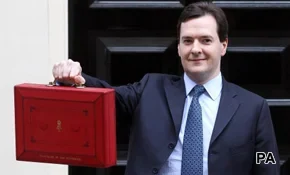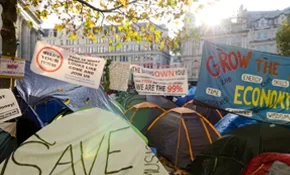What’s in store for capitalism? We invited you to declare your stance on the economic system, and tell us – what shape do you think it will take in future?
The Office for National Statistics has revealed that Britain’s double-dip recession is deeper than previously forecast, with the economy contracting by -0.3% instead of the original estimate of -0.2%.
There is a debate being waged in the UK and Europe over whether governments should plough on with the drive towards austerity, do more to promote growth, or attempt to do a bit of both. And within Britain’s coalition government, there continue to be divisions over whether state regulations intended to protect workers actually hinder prosperity.
667 of you took part to declare your views and ideas for what an ideal economic system would look like. As you might imagine, the discussion generated an interesting debate.
Smaller proportions of participants were at the extreme ends of the spectrum, either arguing that capitalism should be abandoned or that governments should get out of the way and let the markets do their job.
Most of you were in the middle, however, in favour of keeping capitalism but reforming it to varying degrees.
Read below how our participants argued the case for four different stances on capitalism. (The comments below are representative of the range of views.)

Where on the spectrum of the capitalism debate do you stand?

Argument 1 - Capitalism must be radically reformed, but not abandoned
Those of you who wanted to keep capitalism but said it should be radically reformed, told us that a sense of the ‘common good’ must be at the heart of all economic activity.
Participants said that markets should exist to help provide for the welfare of citizens, and that governments should act to ensure corporations are not harming the natural environment.
“Consumerism must be reduced, all actions must be sustainable, and reliance on non-renewable/recyclable materials and ecosystems must stop” Anon
“I feel that the way to achieve the best result in terms of equality would be to encourage co-operative- style businesses, like Waitrose. These businesses make the employee feel as though they are stakes holders in the business and are then incentivised to work harder and feel like they are fully represented at every level” Anon
“The capitalist objective of ‘growth’ should be replaced by sustainability” Anon

“Bankers are laughing at the rest of us. We need to control them, not they control us” Anon
“Individual enterprise and effort is proven to work best to grow an economy. All non-capitalist economies fail since most people are driven by personal desires for growth and success. The problem comes when capitalism turns into unregulated gambling … We need moderation in all things” Anon
“The problem is not capitalism, as such, but how deeply rooted it is in society (the culture of consumerism that led to last summer's riots, for example). In a time of economic difficulty, abandoning the system – especially without a clearly superior alternative -– is a terrible idea, but it needs to be restrained and regulated away from the culture of 'greed is good’” Anon
“Directors’ salaries are increasing unfairly whilst the workers who have just as much input have seen their salaries stagnate. A statutory maximum multiplier of the average salary should be placed on director’s total remuneration” PS, Lancashire
Argument 2 - Capitalism needs to be reformed, but we must be careful not to discourage enterprise and innovation
Participants who were in favour of light-touch state intervention in the economy cited reducing red tape from the EU, and taking steps to help small, locally-based enterprises as things the government could do to drive economic growth.
A reccurring sentiment was that there needed to be a cultural shift away from the ‘greed is good’ ethos of the current system, and that a greater focus on ‘responsible capitalism’ would do more for society than further regulations.
“We need small government, but effective government, not the current system where it is impossible to tell where rampant capitalist greed ends and rampant political greed starts” Jim, West Yorkshire

“We need to encourage risk taking behaviour and accept that it means some people will be richer than others. However, unbridled capitalism is 'the survival of the fittest'. In its extreme form it is an uncaring way to organise a society. We need rules to curb the excesses of capitalism, rules to ensure that it benefits society and not just the individual” Anon
“Punitive or overly heavy-handed measures would damage revenue intake, but efforts to promote responsibility and a sense of charity and community amongst the wealthiest are desperately needed to provide cohesion within the country as a whole. People should have pride in the financial services of this country, that way they will support them. But this can only happen if they change their ethos” Anon
“We need less ‘red-tape’, more opportunities to develop ideas and initiatives. However, we should encourage more locally-based opportunities and reduce the need for imported goods and services; bringing back IT skills to the UK from 3rd world countries” Terry L, Nottingham
“In general, I think the economy does not need much changing; it is society that needs a change. This ‘me first’ attitude and other things have to change; then also the way business is done will change. It is not the economy that is much wrong, it is the people driving it that are” Anon
Argument 3 - Capitalism is in crisis, and the only solution is full-scale socialism
Those of you who were most critical of capitalism in its current form felt that at the most basic level ordinary people were getting a raw deal. You told us that the gap between rich and poor had grown to a point where more and more people were sinking into poverty, while the richest have become even richer.
Participants also said that capitalism’s drive towards endless growth, and its impact on the environment and dwindling natural resources, were further reasons why it must be abandoned in favour of a state-run socialist system.
“We have the means to produce more than anyone can consume yet people go without. All wealth is created by the workers, yet they do not get their fair share of it. Collectively workers can plan to meet the needs of all” Anon
“Markets can stimulate innovation and have a role in strictly circumscribed circumstances, but they tend to monopoly, create and perpetuate gross inequality, and encourage greed and self-centeredness. I believe in equality and sustainability, and believe that this can best be delivered through co-operation, not unequal and rigged competition” Anon

“Utilities, natural monopolies and nationwide services (e.g. health services, roads and railways), provide vital services to the overwhelming majority people within any nation state. If they're allowed to fall into the hands of a minority of individuals solely motivated by profit, not only do the standards of service provided deteriorate and the majority of the population suffer proportionately; the nation's entire sense of moral fairness starts to deteriorate. You cannot have millions bear captive witness to the wanton piggery of a few hundred, or at most, thousand, people directly funded by the majority of those millions and not expect dire consequences” Anon
“With globalised capitalism, governments no longer govern countries. This is done by big business and they are making a very bad job of it” Anon
“I think we need to take pride in community, in sharing, in co-operation … There is something very wrong with a world where there is enough food to feed everyone but not an economic system which enables everyone to be free of hunger. … We need to find another way. If not, we face a very bleak future” Morag, Nottingham
“We need to bring millions out of poverty and put them in democratic, federalised control. That means vast state enterprises in which the public are direct shareholders and over which their workers have direct control. We don't need individual solutions, because our problems are societal” Anon
“So few people have benefitted from the system, plus it is also destroying the planet. … I have lived and also worked in the countryside for 67 years and have slowly watch fauna and flora disappear. The surveys published only confirm what I have seen for myself, and I feel so sad when I think about it” Anon
Argument 4 - Capitalism is the best system we have - more regulation would do more harm than good
Participants in this Lab on capitalism who were most supportive of the current system said that governments everywhere have made the current economic crisis worse by ‘fiddling’ with the economy. They argued that the state has shown itself to be less than competent in managing public finances, and that scaling back the reach of government would allow for more innovation and growth in the private sector.
Those of you who took part told us that more regulations are not necessary, but many said the Government should do a better job of enforcing the existing ones.
“People only complain when in recession. In reality, most of the economic problems we face are the direct result of socialist spending, which we cannot afford. The solution is not more government and socialism, but huge reductions in regulation and expenditure. The free market is the best way out of this mess” Anon
“Our current problems arose because we departed from capitalism. Rather than let bad banks fail the government chose to prop them up, passing their losses on to the public purse and worsening the financial crisis” Anon

“It's not capitalism that's at fault, it's greed and stupidity. If regulators (i.e. the Financial Services Authority) had actually done their jobs, and if rating agencies had actually bothered to analyse financial products they were passing off as AAA, the credit crunch could never have happened. We already have the regulations; they just need to be enforced by organisations that know what they're doing” Anon
“Welfare is a good thing and should be there as a safety net, but it should not hold the rest of us to ransom, and we should not be paying such huge benefits or such vast sums of overseas aid. High taxation and high fuel prices only hold the enterprise in the country back, and discourages people from making more of themselves for themselves” Anon
“The problem at the moment is that governments all round the world are fiddling by trying every possible artificial means to stop the recession that we need to purge the world of excessive debt” Anon
“I agree the bonus system for bankers is crazy, but it is up to the banks themselves to regulate the payments. Shareholders should have more of a say in the distribution. Without capitalism this country would die. Why does the media give so much attention to wasters like Occupy ?”
“The real problem in the UK is the size of the state – far too many people are 'employed' in government jobs that don’t generate any income for the country – they just consume. We need a public sector, but it should be considerably smaller than the wealth generating private sector that we rely on for income. Ever-increasing debt is not the way out” Anon
While the viewpoints expressed by those of you who took part in the debate were varied and diverse, the one commonality among them was an overriding view that something needs to change.

Where on the spectrum of the capitalism debate do you stand?
What do you think the economic system will look like in the future?







